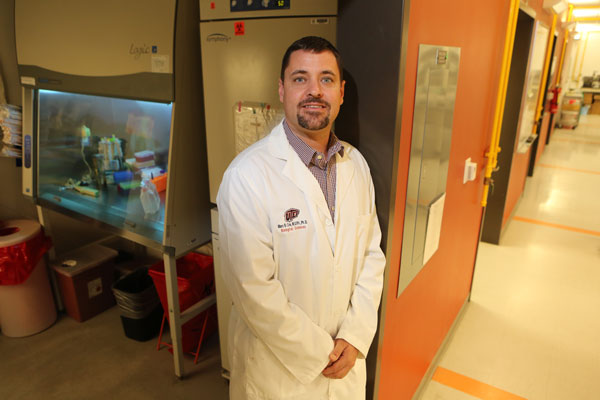
Researchers from UTEP, Clark Atlanta University, the Prostate Centre at Vancouver General Hospital and the University of British Columbia will this summer work toward developing more potent and effective drugs for the treatment of castration-resistant prostate cancer. The group received more than $1 million from the Department of Defense (DOD) Prostate Cancer Research Program (PCRP) for the three-year project.
Prostate cancer affects one in seven men in the United States. In approximately one-third of diagnosed cases, the disease spreads and invades other tissues (metastasizes) to become life threatening. Since prostate cancer requires male hormones, or androgens, to grow and survive, the metastatic form of the disease has been treated with so-called androgen deprivation therapies, actual or chemical castration to prevent the testes from supplying androgens, and use of androgen blockers called anti-androgens. Unfortunately, these treatments only delay the progression of the disease and the cancer invariably returns in a form that no longer responds to these therapies, also called castration-resistant prostate cancer.
“The drugs developed here will be first-in-class for the direct targeting of an androgen receptor-associated co-chaperone for the treatment of castration-resistant prostate cancer, which will help pave the way for the development of similar technologies,” explained Marc Cox, Ph.D., associate professor in the Department of Biological Sciences and UTEP lead in the research. “While no single drug is likely to represent a ‘magic bullet,’ preliminary findings suggest that our strategy will lead to more potent and effective drugs that are likely to show efficacy towards the treatment of castration-resistant prostate cancer, either alone or in combination with existing therapeutics. Thus, we will add new weapons to the clinicians’ arsenal of treatments that will provide greater options for the design of individualized and/or combination therapies, and significantly contribute to the reduction of death from prostate cancer. The preclinical proof of concept data that will be generated in the proposed studies will ultimately generate licensing opportunities, and will be used to attract commercial interest and/or additional funding aimed at the further commercial development of these novel technologies.”
This study is a collaborative project with Jaideep Chaudhary, Ph.D., at Clark Atlanta University in Atlanta, Georgia and Artem Cherkasov, Ph.D., at the Prostate Centre at Vancouver General Hospital and the University of British Columbia. The total approved budget, $1.5 million, is split in three equal parts, with UTEP receiving $500,000 over three years.